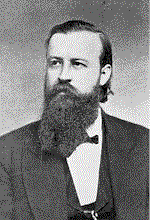an Independent Baptist Web Magazine
James Hall Brookes
Born in Tennessee in 1830, James Hall Brookes was the son of a Presbyterian pastor and church planter.
His father passed away when James was just three years of age. This experience proved to be life changing for him.
Brookes helped to support his widowed mother early in life
(he was a school administrator at the age of 16!). He saved his money, and although he was approved to attend West Point, Brookes surrendered to preach the gospel and headed off to prepare for the ministry at Princeton in New Jersey.
He worked his way through school, met his wife Susan, and went off to his first

pastorate in Dayton, Ohio.
It was not long until his success at Dayton caught the attention of an influential group of believers in the burgeoning frontier town of St. Louis, Missouri. In 1858, Brookes was installed as the pastor of the Pine Street Presbyterian Church. That church, under the
direction of Pastor Brookes, became a soul winning station. It started several churches in the city including the famed Washington and Compton Presbyterian Church which Dr. Brookes himself went to pastor in 1879.
James Brookes pastored for 39 years in the same city of
St. Louis, built a great church and stood for the truth. He preached around the country, and for years headed up the fabled Niagara Conferences that historians recognize as being the forerunner of the Fundamentalist movement in America.
Dr. Brookes would not have known about the label–he
considered himself a Bible-believer and spent considerable time and money defending the Authorized Version. He resisted the English revision committee and proved himself ahead of his time in venerating the King James and warning about the coming confusion concerning translations. It was in this atmosphere that Dr. Brookes started publishing his magazine, The Truth and Testimony of Jesus Christ.
The magazine went world wide and influenced everyone from D. L. Moody to Charles Spurgeon. James Brookes freely exposed the errors of modernism, (unbelief in the
Bible) compromise and clergy unbelief. He gained both a cherished following world wide and astonishing opposition.
Neither of those things moved him. He felt a necessity to publish the Truth and did so until the time of his death–on Easter Sunday, April 18, 1897.
Mail to -
©2000-2002 Prairie Fire Press *texts may be copied for ministry purposes
spotlight[cur].width+200){ direction[cur]=”left” x[cur]-=10 } else if (x[cur]>-200&&x[cur]
